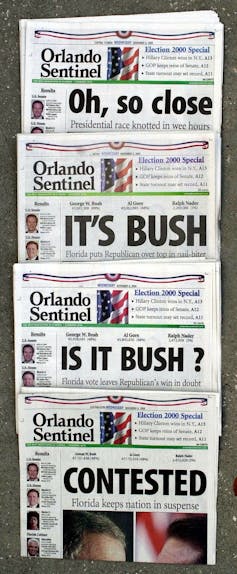There’s an excellent new biography out of James A. Baker III, by Peter Baker (no relation) and Susan Glasser. Some call Baker the most important non-elected figure in Washington in the last half of the 20th Century. He ran five presidential campaigns, was WH Chief of Staff to two Presidents, and was Secretary of State and of Treasury.
I have a new essay out on the chapter concerning Baker’s masterminding of the 2000 election litigation over Florida, which ended with George W. Bush becoming President. To me, at least, the book has three major new revelations about the 2000 election litigation. An excerpt:
The book’s first revelation comes immediately: 45 minutes after being briefed on the situation that morning of Nov. 8, when Bush’s lead in Florida stood at 1,784 votes out of nearly 3 million cast – and before even a machine recount had taken place that would cut that lead by two-thirds – Baker told others: “We’re heading to the Supreme Court.”

When they expressed surprise, Baker followed up by saying: “It’s the only way this can end.”
Baker’s acumen here was stunning. At this stage, and even later in the saga, a large majority even of election law and Supreme Court experts were highly skeptical that the court would get involved at all.
The widely shared view was that the process of recounts would be resolved completely under Florida law and through Florida’s administrative processes and courts. That’s how election challenges, even in federal elections, had always been handled. Baker’s first choice to lead the litigation effort, former Senator John Danforth of Missouri, reflected this common view.
Danforth told Baker, “I just can’t conceive that a federal court’s going to take jurisdiction over a matter relating to state election law … I just can’t believe that.”..
The second revelation in the book is highly disturbing, if accurate.
Litigating the outcome of the 2000 election began with the Gore campaign filing requests under Florida law for manual recounts in four counties. Two weeks after Election Day, the litigation made its first appearance before the Florida Supreme Court. Just before the argument was about to begin, Baker was reportedly handed a note from an intermediary who somehow knew that the Florida justices had already decided among themselves that they were going to rule against Bush and had written a draft opinion to that effect.
Once they got this note, Bush’s lawyer for the argument, Michael Carvin, asserts they decided “to lose and lose big,” in order to bait the Florida Supreme Court into a broad decision that would make U.S. Supreme Court intervention more likely.
Whether Carvin’s self-serving strategic claim is accurate or not, that’s exactly what happened. The Florida Supreme Court approved a manual recount and ordered the deadline for certifying the outcome extended by 12 days. The U.S. Supreme Court – to the surprise of many – agreed to hear the case. …
The third revelation involves an issue that has swirled around the current election: the possible role of state legislatures in directly appointing presidential electors, rather than permitting the will of the voters to determine who has won the presidential election – and hence the electors – in that state.
Federal law permits a state legislature to appoint electors if the election has “failed” in that state – a term whose meaning the law does not clarify. …
The closest the U.S. has ever come to that happening is Florida in 2000. After the Florida Supreme Court decision that the Bush campaign lost, Baker asserted to the press that the Florida court had changed the rules after the election, by approving a manual recount and extending the deadline for certifying the election by 12 days.
Then Baker threatened: “So one should not now be surprised if the Florida legislature seeks to affirm the original rules.”
And indeed, in early December, the Florida legislature announced it would convene a special session to discuss appointing Florida’s electors itself.
That much is a matter of public record. But what the new biography reveals is that, while Baker wanted this to be seen as a threat, he did not want Florida’s legislature to go through with it….
Some Democrats will never forgive Baker, nor the Supreme Court, for their roles in ending the recount before all the ballots were counted – though a consortium of major newspapers later determined that if the recount had been completed, Bush would have won under 21 of 24 possible standards for what constituted a valid vote.
But Democrats involved in the litigation battles knew the other side had the more effective leader. Indeed, the new Baker biography claims that when Baker was put in charge of the Florida contest, his “reputation was so formidable that Democrats knew they would lose the moment they heard of his selection.”
I can confidently say that thought did not cross the mind of any Democrat when Rudy Giuliani was put in charge this time around.